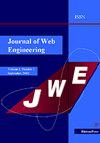A Framework for Blockchain-Based Secure Management of Mobile Healthcare (mHealth) Systems
IF 1
4区 计算机科学
Q4 COMPUTER SCIENCE, SOFTWARE ENGINEERING
引用次数: 0
Abstract
In recent years, several research and development initiatives have focused on developing secure and trustworthy systems for the healthcare industry via pervasive and mobile healthcare (mHealth) solutions. State-of-the-art mHealth solutions primarily rely on centralized storage, such as cloud computing servers, which may escalate the maintenance costs, require ever-increasing storage infrastructure, and pose privacy and security risks to the health-critical data produced, consumed, and transmitted over ad hoc networks. To overcome these limitations, we conducted this study intending to synergize mobile computing (devices to process health-critical data) and blockchain technology (infrastructure to secure storage and retrieval of health-critical data), specifically addressing data security and privacy using a blockchain mHealth system. The research employs an incremental method by (i) developing a framework that acts as a blueprint to architect blockchain-enabled mHealth systems, (ii) implementing a suite of algorithms as a proof-of-concept to automate the framework, and (iii) experimental evaluations to validate the scalability, computation, and energy efficiency of the proposed solution. The proposed framework has been implemented as a frontend using a mobile application interface that exploits the backend via the InterPlanetary File System (IPFS) system and Ethereum blockchain for secure management of mHealth data. We use a case-study-based approach demonstrating how health units, medics, and patients can securely access and distribute health-critical data. For evaluation, we deployed a smart contract prototype on the Ethereum TESTNET network in a Windows environment to test the proposed framework. Results of the evaluation indicate (a) scalability with query response time (range: 10–41 ms), (b) computational performance (CPU utilization: 1.5% – 2.5%), and (c) energy efficiency (gas consumption: 40000 units for 1000 bytes). The proposed solution – framework, algorithms, and experimental evaluation – aims to advance state-of-the-art architecting and implementing cybersecurity mHealth solutions using blockchain technology.基于区块链的移动医疗(mHealth)系统安全管理框架
近年来,一些研究和开发计划的重点是通过普及和移动医疗保健(mHealth)解决方案为医疗保健行业开发安全可靠的系统。最先进的移动医疗解决方案主要依赖于集中存储,如云计算服务器,这可能会增加维护成本,需要不断增加的存储基础设施,并对通过临时网络产生、消费和传输的健康关键数据构成隐私和安全风险。为了克服这些限制,我们进行了这项研究,旨在协同移动计算(处理健康关键数据的设备)和区块链技术(安全存储和检索健康关键数据的基础设施),特别是使用区块链移动健康系统解决数据安全和隐私问题。该研究采用了一种增量方法,通过(i)开发一个框架,作为构建支持区块链的移动医疗系统的蓝图,(ii)实施一套算法作为概念验证,以实现框架的自动化,以及(iii)实验评估,以验证所提出解决方案的可扩展性、计算和能源效率。所提出的框架已作为前端实现,使用移动应用程序接口,通过星际文件系统(IPFS)系统和以太坊区块链利用后端来安全管理移动健康数据。我们使用基于案例研究的方法来演示卫生单位、医务人员和患者如何安全地访问和分发对健康至关重要的数据。为了进行评估,我们在Windows环境下的以太坊TESTNET网络上部署了一个智能合约原型,以测试提议的框架。评估结果表明(a)查询响应时间的可伸缩性(范围:10-41 ms), (b)计算性能(CPU利用率:1.5% - 2.5%),以及(c)能源效率(气体消耗:1000字节40000个单位)。提出的解决方案-框架,算法和实验评估-旨在使用区块链技术推进最先进的网络安全移动医疗解决方案的架构和实施。
本文章由计算机程序翻译,如有差异,请以英文原文为准。
求助全文
约1分钟内获得全文
求助全文
来源期刊

Journal of Web Engineering
工程技术-计算机:理论方法
CiteScore
1.80
自引率
12.50%
发文量
62
审稿时长
9 months
期刊介绍:
The World Wide Web and its associated technologies have become a major implementation and delivery platform for a large variety of applications, ranging from simple institutional information Web sites to sophisticated supply-chain management systems, financial applications, e-government, distance learning, and entertainment, among others. Such applications, in addition to their intrinsic functionality, also exhibit the more complex behavior of distributed applications.
 求助内容:
求助内容: 应助结果提醒方式:
应助结果提醒方式:


